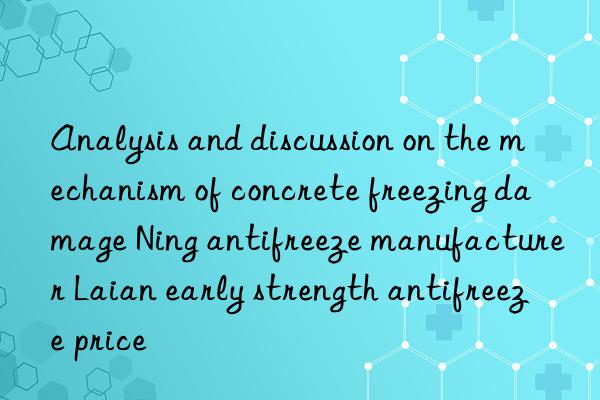
There are three important conditions for concrete to be damaged by freezing, namely humidity, water and the pore condition of the internal structure of concrete. These three conditions are indispensable. When the temperature drops below 0°C, the water phase is promoted to transform into ice. After the water freezes, the volume expands by 9%, causing the internal structure of the concrete to be destroyed.
Water mainly depends on the construction conditions
When the water-cement ratio is large during construction, the moisture content of concrete increases Large, resulting in severe frost damage to concrete.
The pore state of the internal structure of concrete
The pore state of the internal structure of concrete is determined by the concrete mix design and construction level. Improper design and construction will increase the porosity inside the concrete, make the pore diameter larger, and increase the free water content, resulting in serious frost damage to the concrete.
Concrete is a porous material that forms pores of different sizes and interconnected capillary channels during and after hardening. After these pores and capillary channels are filled with water, when the temperature drops, the freezing damage to concrete can be summarized as the following points:
When the temperature drops below 0℃, The free water in the capillary pores inside the concrete begins to freeze and expands in volume;
The freezing of structural components starts from the surface and gradually develops toward the interior. After the water on the surface freezes, , expands due to freezing, seals the unfrozen part of the water inside and presses it toward the inside along the capillary channel;
As the freezing progresses, the frozen volume becomes larger and larger. As the pressure increases, the internal unfrozen water pressure becomes higher and higher. When the internal pressure exceeds the tensile strength of the concrete, the capillary pores will burst and micro-cracks will occur. Water will flow into the cracks under a certain pressure. At this time, the hydrostatic pressure inside the capillary pores decreases, and the damage is alleviated;
After that, the freezing continues to develop deeper, and the water pressure continues to increase, When it reaches a certain level, the cracks may continue to expand and eventually new cracks will develop. The cracks will continue to develop and increase, causing damage to the interior of the concrete; When the pores are filled with water, or a large number of pores are introduced into the concrete due to the addition of air-entraining agents during construction, the pressure of unfrozen water under pressure will flow into the pores through penetration or capillary pores, reducing the hydrostatic pressure. Small, thus reducing the cracks inside the concrete and improving the frost damage resistance of the concrete.
<img src="/upfile/202210/2022101830586343.jpg"/


 微信扫一扫打赏
微信扫一扫打赏
